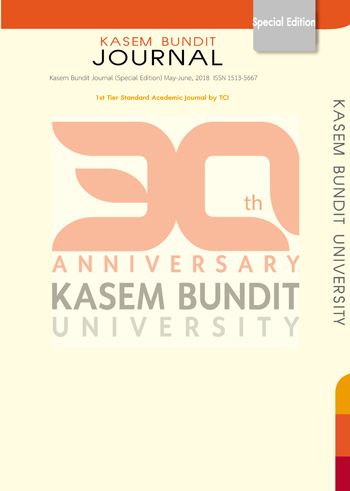Website blocking as Legal Measures to control Online Gambling: A comparative analysis of Thai, U.S. and Singapore laws
Keywords:
Website blocking, Computer law, Online gambling law, Freedom of expression, Cybercrime law.Abstract
In Thailand, gambling is generally prohibited by the specific law, The Gambling Act, but this law does not stipulate clearly and comprehensively on the measure to control online gambling especially technical measures such as website blocking. However, computer crime Act B.E. 2560 provides certain mechanisms that can be applied to block online gambling websites such as notice takedown in section 15 and blocking from court order in section 20. Nevertheless, those principles still have limitations in scope and elements as well as interpretation problems in application to online gambling websites This research will conduct comparative analysis of website blocking measures in Thai laws with foreign laws, i.e. Unlawful Internet Gambling Enforcement Act of 2006 (UIGEA) of the U.S., Remote Gambling Act 2014 (RGA) of Singapore. In addition, the negative impact of these measures, both technical and legal aspects such as freedom of expression will be discussed.
References
[2] Carmen Messerlian, Jeffrey Derevensky, and Rina Gupta. (2005). “Youth gambling problems: a public health perspective”. Health Promotion International. Vol. 20 : 69-79.
[3] Stephen Monkcom, Gerald Gouriet QC, and Jeremy Phillips. (2017). The Law of Gambling. Bloomsbury Professional.
[4] Daniel A. Leslie. (2014). Legal Principles for Combatting Cyberlaundering.Springer.
[5] Mark Lemley, David S. Levine, and David G. Post. (2011). “Don’t Break the Internet”. Stanford Law Review Online. Vol. 64 : 34.
[6] Luca Belli and NathaliaFoditsch. (2016). “Network Neutrality : An Empirical Approach to legal interoperability”. inNet Neutrality Compendium: Human Rights, Free Competition and the Future of the internet. edited by Luca Belli and Primavera De Filippi. Springer.
[7] EminCaliskan. (2017). “Risk analysis of internet censorship circumvention : Case study of anonymizaiton tools and effects”. inStrategic Cyber Defense: A Multidisciplinary Perspective. edited by Unal Tatar, YasirGokce, and Adrian V. Gheorghe. IOS Press.
[8] Human Rights Watch. (2005). False Freedom: Online Censorship in the Middle East and North Africa. Human Rights Watch.
[9] Bernadette H. Schell. (2014). Internet Censorship: A Reference Handbook. ABC-CLIO, LLC.
Downloads
Published
How to Cite
Issue
Section
License
ทัศนคติ ความคิดเห็นใด ๆ ที่ปรากฏในวารสารเกษมบัณฑิตฉบับนี้เป็นของผู้เขียน โดยเฉพาะ มหาวิทยาลัยเกษมบัณฑิตและบรรณาธิการ ไม่จำเป็นต้องมีความเห็นพ้องด้วย







